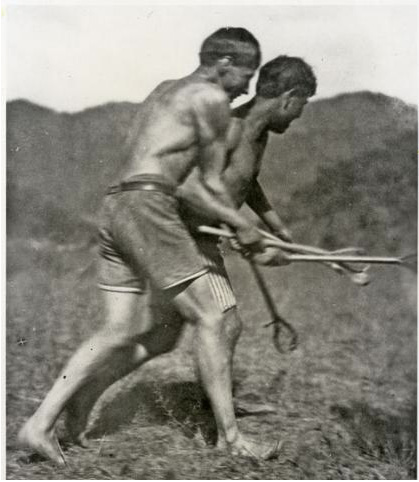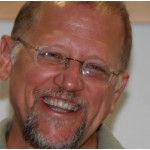Undergraduates in the Archives – Powell 3
By
Timothy B. Powell
February 2012
3What has been your best experience or greatest success?
Timothy B. Powell
Director, Native American Projects – American Philosophical Society
Senior Lecturer, Department of Religious Studies – University of PennsylvaniaEditor, Gibagadinamaagoom: An Ojibwe Digital Archive
¶ 1
Leave a comment on paragraph 1 0
There have been many exciting outcomes from the students’ interactions with archival materials. In the spring of 2010, the class project was to design a digital exhibit that would bring together Penn anthropologist A. Irving Hallowell’s Ojibwe photographs from the American Philosophical Society and Ojibwe artifacts from the Penn Museum, all of which were collected in the 1930s. (See Figure 1.) Figure 1: “Ojibwe Bandolier Bag,” Penn Museum, photograph by David McDonald, DMcD Productions. Not long before the semester started, I had been contacted by Gord Jones, the project manager of Pimachiowin Aki Corporation, who is working on submitting a UNESCO World Heritage Site grant application to preserve 40,000 square kilometers of boreal forest and the cultural landscape of five Ojibwe First Nations. One challenge of the grant is to define a “cultural landscape.” A number of scholars associated with the Pimachiowin Aki project had come to the APS and digitized material from the Hallowell collection. Hallowell had worked in Ojibwe First Nation communities in northern Manitoba and Ontario for ten years, so there was a large amount of material related to this very small, remote place. The students photographed and documented the objects from the Hallowell collection at the Penn Museum and presented them to Ojibwe representatives of the Pimachiowin Aki project at a conference held at the APS shortly after the semester ended. The students’ material is now part of a historic project, the first UNESCO World Heritage Site application ever submitted by the Canadian government on behalf of First Nations.
Figure 1: “Ojibwe Bandolier Bag,” Penn Museum, photograph by David McDonald, DMcD Productions. Not long before the semester started, I had been contacted by Gord Jones, the project manager of Pimachiowin Aki Corporation, who is working on submitting a UNESCO World Heritage Site grant application to preserve 40,000 square kilometers of boreal forest and the cultural landscape of five Ojibwe First Nations. One challenge of the grant is to define a “cultural landscape.” A number of scholars associated with the Pimachiowin Aki project had come to the APS and digitized material from the Hallowell collection. Hallowell had worked in Ojibwe First Nation communities in northern Manitoba and Ontario for ten years, so there was a large amount of material related to this very small, remote place. The students photographed and documented the objects from the Hallowell collection at the Penn Museum and presented them to Ojibwe representatives of the Pimachiowin Aki project at a conference held at the APS shortly after the semester ended. The students’ material is now part of a historic project, the first UNESCO World Heritage Site application ever submitted by the Canadian government on behalf of First Nations.
¶ 2
Leave a comment on paragraph 2 0
Last semester my students worked in groups to curate an exhibit entitled Cherokee Stickball, based on the research of Frank Speck, a highly distinguished anthropologist. Speck taught at Penn for half a century, collecting more than forty stickball sticks for the Penn Museum and depositing photographs of Cherokee stickball games at the APS. (See Figure 2.)  Figure 2. Cherokee Stickball, American Philosophical Society, Frank Speck collection. In the 1930s, Speck worked with a Cherokee Medicine Man named Will West Long, who provided Speck with a rich ethnographic description of the spiritual dimensions of the game. Will West’s grand nephew, T.J. Holland, came to the APS conference in the spring of 2010, and I had the opportunity to interview him along with another very knowledgeable elder, Tom Belt. The students created Quick Time videos that combined Speck’s photographs taken in the 1930s with the contemporary oral histories. They also photographed all of the sticks in the Penn Museum’s collection and created a database of descriptive materials. One of the students won a Mellon grant through Penn to take the digital materials to the Eastern Band of the Cherokee in North Carolina. Today, Cherokee craftsman are recreating the older sticks based on the students’ photographs, and the videos will be used in a museum exhibit that will be displayed at the tribally owned Junaluska Museum, located in Robbinsville, North Carolina.
Figure 2. Cherokee Stickball, American Philosophical Society, Frank Speck collection. In the 1930s, Speck worked with a Cherokee Medicine Man named Will West Long, who provided Speck with a rich ethnographic description of the spiritual dimensions of the game. Will West’s grand nephew, T.J. Holland, came to the APS conference in the spring of 2010, and I had the opportunity to interview him along with another very knowledgeable elder, Tom Belt. The students created Quick Time videos that combined Speck’s photographs taken in the 1930s with the contemporary oral histories. They also photographed all of the sticks in the Penn Museum’s collection and created a database of descriptive materials. One of the students won a Mellon grant through Penn to take the digital materials to the Eastern Band of the Cherokee in North Carolina. Today, Cherokee craftsman are recreating the older sticks based on the students’ photographs, and the videos will be used in a museum exhibit that will be displayed at the tribally owned Junaluska Museum, located in Robbinsville, North Carolina.


0 Comments on the whole post
Leave a comment on the whole post
0 Comments on paragraph 1
Leave a comment on paragraph 1
0 Comments on paragraph 2
Leave a comment on paragraph 2